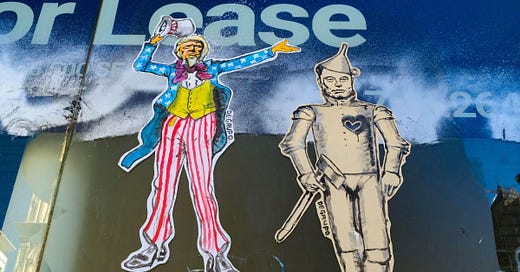
Discover more from REACTION
The bombing of Syria by the US, UK, and France was greeted by certain sections of the press with everything from warnings that this might be the start of World War III to the near certainty that it is the start of World War III.
“It is debatable exactly when the world last found itself in such a perilous situation,” wrote Julian Border in The Guardian. “In the gravitational pull of these agendas and allies, there are disturbing echoes of the eve of the first world war. It has more than a whiff of Sarajevo 1914 – with nuclear weapons looming not far off stage.” Owen Jones, meanwhile, railed that “an attack on Syria could be disastrous. But the warmongers won’t be told.” In The New Statesman, Nicky Woolf describes “tensions in Syria rising to boiling-point”, whilst The Daily Express ran the headline “World War 3 fears as Russia and the USA clash over Syria chemical strike.”
A little hysteria is understandable given we live in a hysterical age, where bad news is known to travel more quickly and widely than good news. When your revenue is determined by how many people click on your stories, you need to make those headlines clickable, even if it means also making them wrong. It is also why Vladimir Putin continues to win a game he seems to have invented. It’s neither open warfare nor traditional propaganda. It is something between the two; a conspicuous attempt to promote intellectual doubt and drive emotional fears. He seeks to manipulate openness in open societies until they turn upon themselves, make the benefits of democracy become democracy’s unraveling, and turn freedom of speech into the freedom to believe any stupid thing you’ve read on the internet.
Putin understands the power that big media has upon a populace. RT is his own version of news media that’s been weaponized; a guided missile aimed at the hardened bunkers of our institutions, which, admittedly, range from honest journalism to undisguised bias. Stoking fears is what some in our media, both left and right, have always done so well that it becomes a feedback loop: the more that people fear, the more that the newspapers feel justified in reporting those fears. Over on the right, fears are stoked about immigration, gender politics, and “cultural Marxism”. On the left, it’s power, inequality, and neocon plans for Middle East war. Shared by both sides is the fear of globalization. The result: people who fear more than they’ve feared before, despite having significantly less to worry about.
If you were unfortunate enough to take to Twitter this past weekend, the apocalyptic humour was evident but so was the seriousness of those worried that the Syria conflict would escalate. Guardian columnist Dawn Foster tweeted her outrage that the strike had happened in the middle of the night. “The absolute cowardice of May and Macron sneaking this out in the early hours of the morning,” she said, apparently oblivious to the reasons why military strikes often happen under the cover of darkness. You’d be right to think it a strange unworldly outlook that admits no logical sense. The partisan divides are so absolute that unless you’re anti-war, you are labeled as “pro-war”. No reasonable calculated position between the two is permitted. The language of “useful idiots” might not be helpful but questions should again be raised by Jeremy Corbyn’s admonition that the strike could be the “precursor to wider military action”. In this worldview, power is inherently bad, even power when used to prevent genocide.
Any sane person would be anti-war but the surest path towards conflict is a position of principled capitulation at every turn. Undoubtedly, there are many reasons why the weekend’s action was a bad idea, not least that it revealed a lack of strategy over Syria and the fitful nature of American policy, being either “all out” or “all in” depending on the time of day and the President’s mood. None of what happened was aimed towards solving the Syrian situation. Rather, it can be seen as tacit approval of a kind; that Assad is safe so long as his barbarism remain conventional barbarism.
Yet whether we like it or not, a red line had been drawn and it needed affirming. It had not, however, been drawn by Donald Trump or, for that matter, President Obama. It was drawn in 1925 when the Geneva Protocol banned “asphyxiating, poisonous or other gases and bacteriological methods of warfare”. The Western powers were compelled to act in order to ensure that red line remains in place. The alternative would be to sanction further chemical attacks in a region where tribal conflict ensures that civilians will always be perceived as the root of the problem. These wars are primed for genocide and to leave the gassing of Douma unanswered would have been morally negligent.
Yet in acting, the United States and its allies chose a course of action that spoke a language more than it affected change. The strike was of a kind that we’ve seen before, with consequences that were predictable before even the first missile hit its target. This was never going to be the first step towards a wider conflict. The US used the de-escalation hotline to warn the Russians about the attacks, giving them enough time to ensure that no Russians would be harmed. The attacks themselves were forceful but symbolic. In response, the Syrians have been defiantly upbeat, though it’s also telling that there have been none of the usual immediate attempts to apportion blame for civilian deaths.
None of that is to diminish what is happening in Syria but to merely point out that there’s much that’s happening here that has to do geopolitical positions being staked out. If we really must engage in the language of world wars, then we might say that a world war is already happening but of a very unconventional kind. This is meta-war, where the genre of warfare is itself explored and its conventions redefined. Russia now understands a little more about Western resolve but, perhaps more worryingly, some structural flaws (Trump still refuses to go too hard on Putin). The West reaffirmed some degree of solidarity, not just between each other but to higher principles, yet their actions seemed habitual, forced, reluctant, and, arguably even weakening. This almost becomes that philosophical question: if a one million dollar missile demolishes a building that cost one hundred thousand dollars to erect, which side did the most damage? Did the missile destroy the building or was it the other way around?
The Russians are also free to do what the Russians have become extremely adept at doing. Before the strikes, they had various spokespeople warning about the possibility of retaliation — that they might actually turn on their own air defence systems and target some allied planes — but it all came down to rhetoric and posturing. Putin is accomplished in the role he’s carved for himself and now sits menacingly to one side, projecting more power than he has with his stagnant economy. Speaking in a phone call to Iran’s leader Hassan Rouhani, Putin warned that the strike could cause “chaos in international relations” as though there’s not already considerable chaos. He meddles in a civil war (feeds a false narrative about British involvement in the Douma attack) and causes all manner of headaches for Western leaders. America’s news networks have spoken about little else since the strikes, whilst UK politics is now dominated by factions arguing over the morality of military action. Donald Trump boasts of “mission accomplished” but the aims of that mission still remain unclear while the accomplishment might not even be his.
Subscribe to REACTION
Iain Martin and the team make sense of the news, providing commentary and analysis on the stories that matter in politics, geopolitics, economics and culture.











